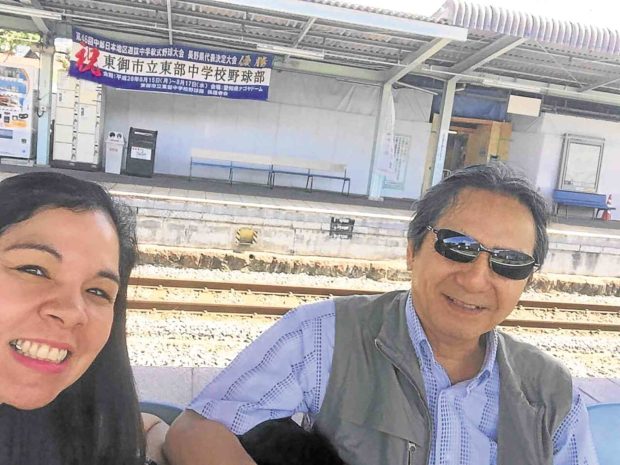Tourism ad message is ‘genuine’

Kukai Nye and her husband, blind retiree Masaru Uchimura at a train station in Japan. —CONTRIBUTED PHOTO
Despite the controversy, the Department of Tourism commercial featuring blind Japanese retiree Masaru Uchimura was based on a real person with a real life story, his wife said Saturday.
“The message the ad wants to convey is genuine,” said Uchimura’s Filipino wife Kukai Nye, a native of Bacolod City.
Nye said she and her husband, whom she and their friends call “Massy,” are sorry people feel the television commercial was a little too similar to a South African ad two years ago.
“[But] it’s based on Massy’s true story,” Nye told the Inquirer from New York in an online Facebook chat.
“He traveled to a lot of other places like New Zealand, Australia, Hong Kong, Macau, China, Vietnam and the United States,” she said.” He was also looking for a place to retire and he chose to stay in the Philippines.”
“He enjoys his experiences in the Philippines and he recommends our country to his friends,” said Nye, who shared several pictures of her husband.
Nye said her husband has not only gone to the Northern Luzon destinations shown in the commercial but also to many other places in the Visayas. She accompanies him on his trips.
She said Massy appreciates living in the tropics because “there’s no snow here. In fact, even Baguio is cold for him.”
The 37-year-old Nye, a caregiver, met Massy in 2005, when he was a 61-year-old retired civil servant who first visited the Philippines the year before.
“At first, he wanted a Chinese caregiver because he also speaks Chinese. But most of his Japanese friends recommended he get a Filipina because ‘they are the best in the world and they take care of you like you’re family,’” Nye said.
“He listened to his friends, who have traveled around the world like him and who told him there’s something special about Filipinos [who] have a happy outlook in life,” she added.
After hiring Kukai, Massy brought her to Japan but they later returned to the Philippines and lived in Dumaguete City for one year and in Mactan, Cebu for seven years.
While in Mactan, Uchimura got a special resident retiree visa (SRRV) issued by the Philippine Retirement Authority and urged his foreigner friends to get their own SRRVs because of its benefits.
Uchimura, Nye said, has since grown fond of Filipino food, favoring Bacolod inasal (barbecued chicken), lechon, dinuguan and balot.
As shown in the ad, he also favors San Miguel Beer and is a big fan of Bacoleño musician Jose Mari Chan.
Uchimura, who is fluent in English, is also very comfortable in the Philippines because people understand him.
“Nearly everybody can speak or understand English, so he has no problem interacting with people,” Nye said.
And although blind, Nye said Uchimura has said he can sense and hear the joy of the Filipinos around him.
“Despite his handicap, he loves traveling around the Philippines, meeting people. He’s glad being given a chance to promote our country whose people he loves very much,” Nye said.
Nye said both she and husband thought the commercial was beautiful and regretted the DOT has decided to cancel its P650-million contract with its producer, McCann WorldGroup Philippines.
“He and I were very happy with the video. He’s now suddenly famous. The ad is beautiful. It’s a shame it had to be pulled out,” she said.
Uchimura, who is turning 73 on June 22, is currently in Tokyo for medical treatment but, Nye said, they hope to be together by October when they will stay for good in their new farm in Talisay, Negros Occidental, near Bacolod City.
“We are both eager to return home soon because we miss our dogs,” she said, looking forward to their 10th wedding anniversary on June 27.
“Massy is old but young at heart,” Nye said, adding he will surely continue to travel around the Philippines, enjoying his encounters with Filipinos and their culture.